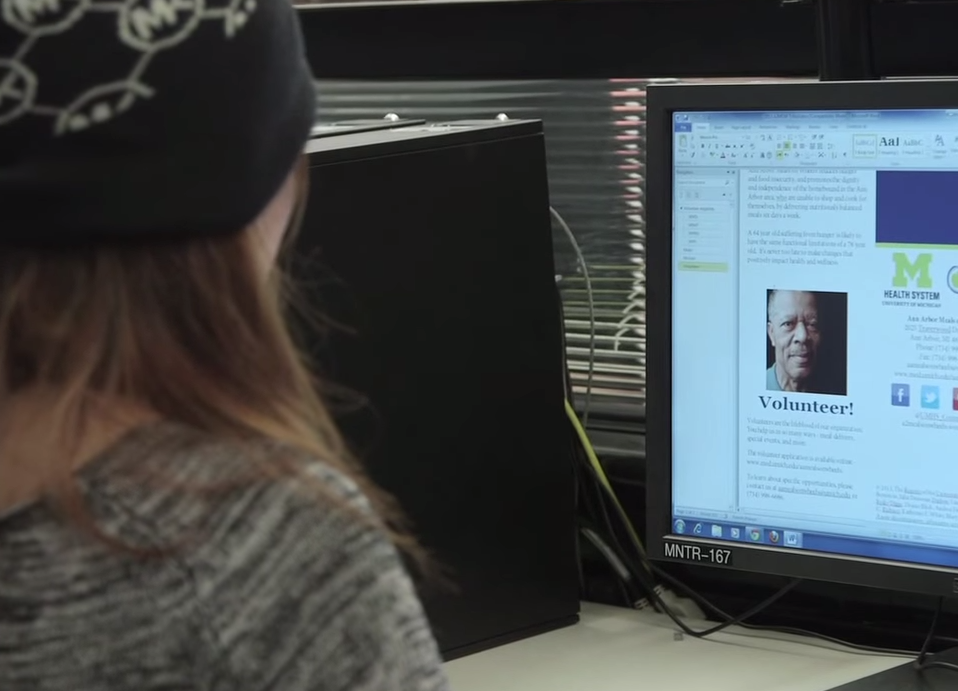
Three students working on a campus welcome brochure had to stop for a brief discussion about how to translate the organization’s name into Mandarin. The Spectrum Center’s literature says the group works to promote inclusion on campus, with particular emphasis on sexual orientation, gender identity and gender expression. It was the name “Spectrum” that didn’t translate easily.
A few tables over, students and staff working on a color therapy brochure in German were wrestling with the term seelen-kalender, which literally translated means “soul diary.” The volunteers decided the best English equivalent was “spiritual diary.”
In an adjacent room, one student was using a dictionary to try to see if there was an Arabic equivalent for the word “homebound.” She was translating a Meals-on-Wheels web brochure and concluded she would just have to use a long explanation: people who are unable to leave their houses.
These volunteers, representing 15 different languages, were among 67 people who signed up for the second annual Translate-a-thon, during which 50 projects were translated. The event was held for the first time last year as part of the Translation theme semester in the College of Literature, Science & the Arts.
On the surface, organizers say, translating from one to another sounds like a simple process for those proficient in more than one language. But the intricacies and nuances of languages don’t always make exact translation easy.
“As we look at this English text, there are things that we see hundreds of times, yet we don’t think twice about them. But when you have to translate that one term into a different language, it takes on a whole new meaning,” said Julie Evershed, director of the Language Resource Center. “So you really have to think about it in a completely different way. It brings a lot to your own language, as well as what you’re translating.”
For the students who participated, like Cathy Chow, the event offered the opportunity to hone language skills. The German major said she is not enrolled in a language class this semester, so coming to the Translate-a-thon allowed her to keep her skills sharp.
“Just being able to talk to all of these people who have better German skills than I just helps you understand the different words,” she said. “It’s good collaborating with older people and all of these people from different backgrounds.”
Chow said it was a slow process translating a brochure from the Klinghardt Academy about the psychological effects of color on health, an increasingly popular alternative medicine form in Europe. But even more difficult, was the project her team tried to tackle the day before, transcribing hand-written documents for the Holocaust Memorial Museum.
“It was definitely interesting to be asked to translate something that might be used in the museum. We knew it was going to be challenging beforehand but we decided to give it a try anyway,” she said of their initial failed attempt to make headway on the smudged notes in hard-to-decipher cursive.
While polishing translation skills was a major motivator for some, the students also were interested in helping the non-profits and other organizations that could not afford to pay for such services.
“People in the non-profit community have been very receptive because they have so many people they need to reach,” Evershed said.
“The students seem to really be excited that the material they are translating actually is going to be available to the community,” said event organizer Emily Goedde, a doctoral student research assistant with the Engaging Translation MCubed Project, which was a co-sponsor with the Department of Comparative Literature and Language Resource Center. The Office of the Vice Provost for Global and Engaged Education also supported the event.
Celia Kaechele, a junior in political science and international studies, was happy to translate the Meals-on-Wheels material into Arabic for a couple of reasons.
“I had heard a little bit about Meals-on-Wheels before, and just from translating I know so much more,” Kaechele said.
The brochure she was working on told people in English how to volunteer and donate to the organization.
“There’s that barrier that might prevent someone from volunteering, who really wants to, just because they don’t have the information they need.”
Even as a fourth-semester Arabic student, Kaechele had to keep an English-to-Arabic dictionary close at hand, as like the others she found there isn’t always a simple translation.
Local businessman Kenji Yano also stopped by North Quad to see what the students were doing. His company, Sunrizing, offers multi-lingual communication services, and he was interested to see how the students might help local businesses that need to think globally.
“Language barriers still are huge, even with the Internet. Tools do not address these language barriers,” Yano said. “How can we help our communities work globally? Thirty to forty years ago we relied on what the federal government would do on our behalf. These days citizens in communities like Ann Arbor need to work directly with global partners,” he said.
Students filtered in and out during the Friday through Sunday event. And while most of the time the three adjoining rooms were quiet, the occasional discussion about how to handle a translation broke the silence.
Take that conversation over how to translate “Spectrum.” Vickie Yuan, a business administration major, said they finally landed on the Mandarin word for rainbow, to “capture the diversity” of the people served by the organization.


